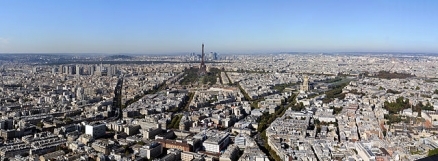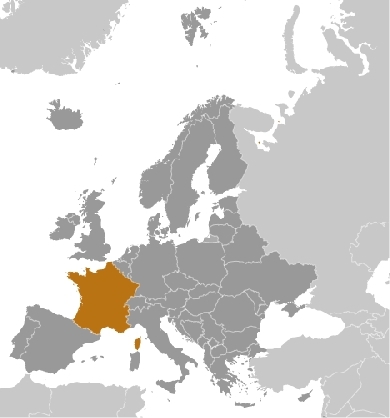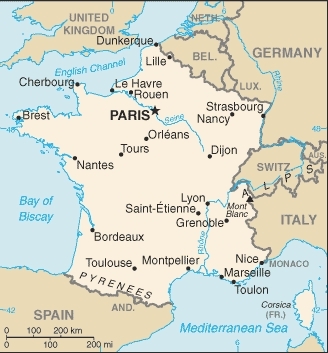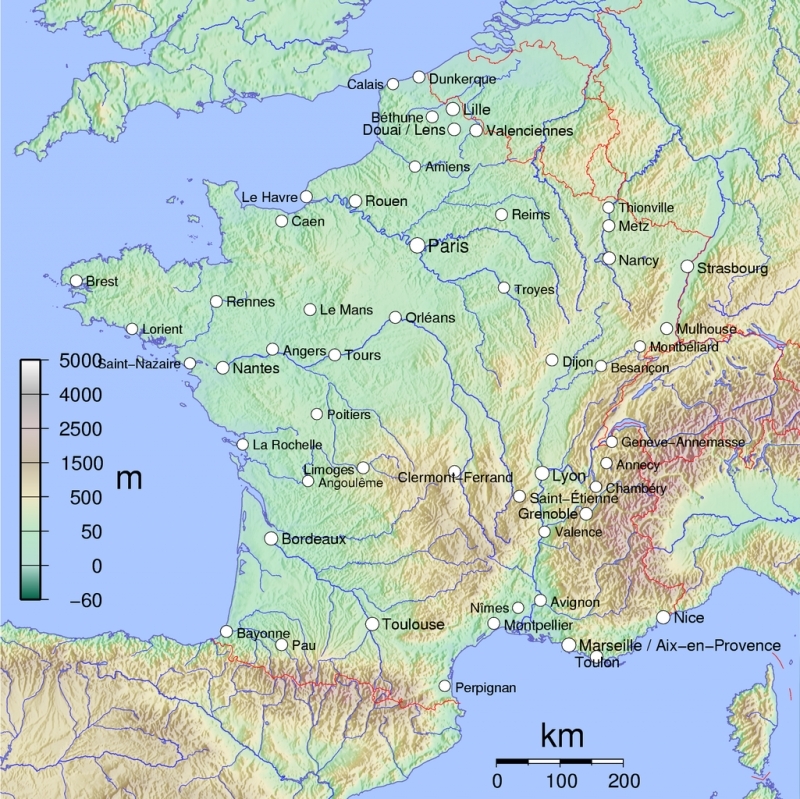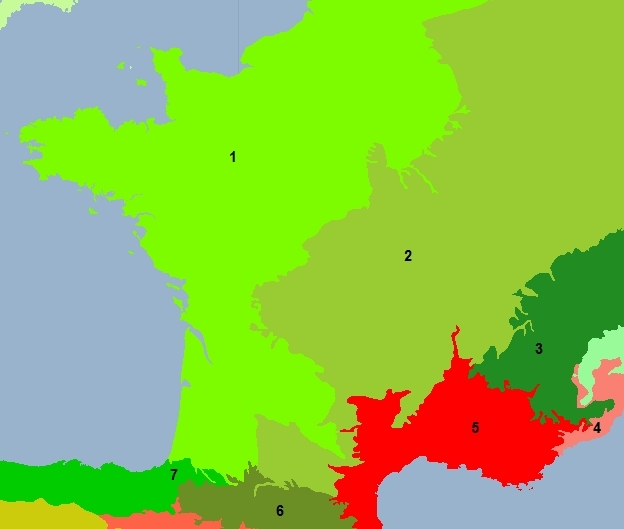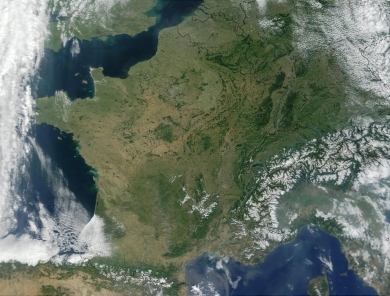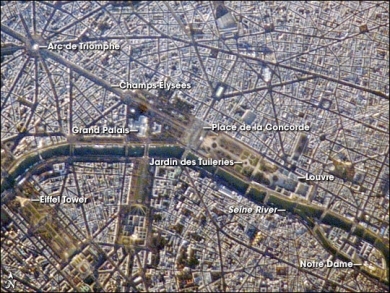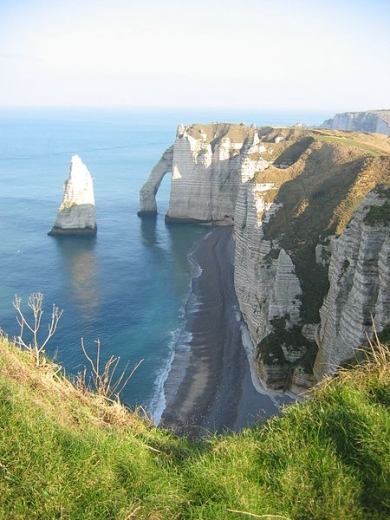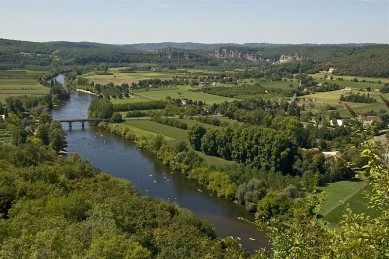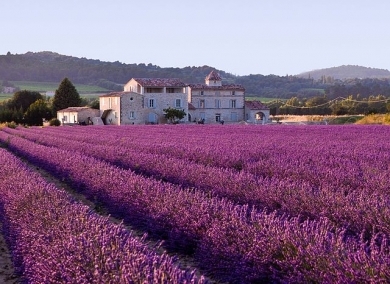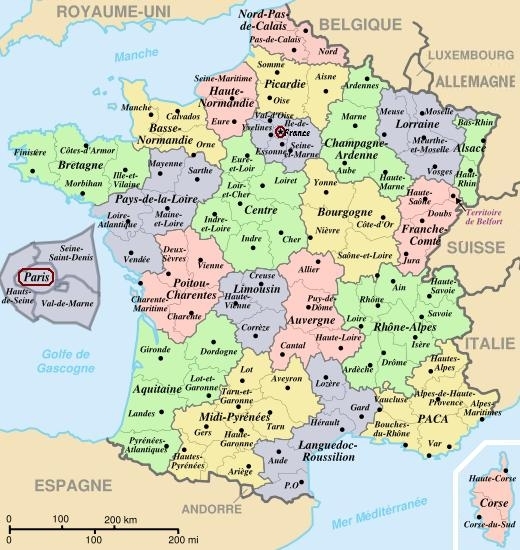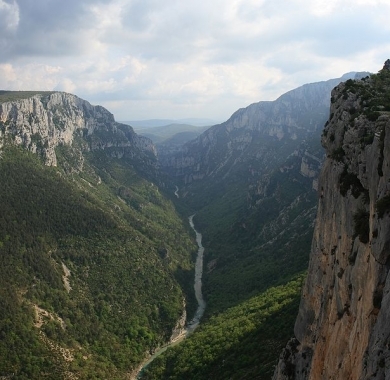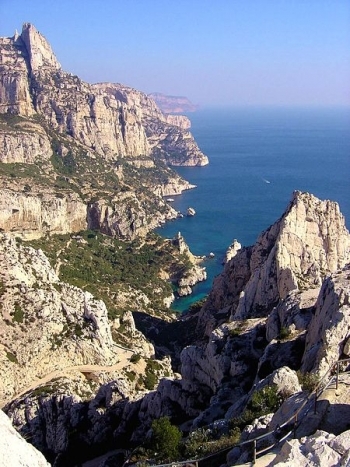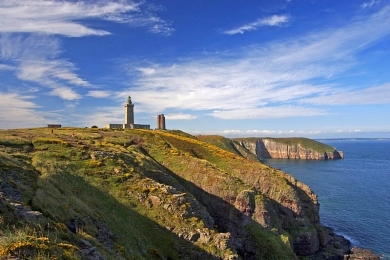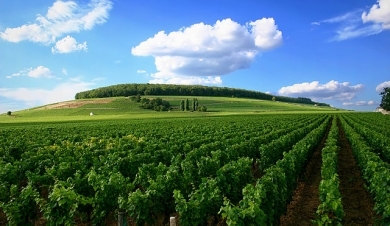France
Contents
Introduction
France is a nation of sixty-five million people located in western Europe (Metropolitan France which includes the island of Corsica and has sixty-three million people) and in five overseas regions ( French Guiana, Guadeloupe, Martinique, Mayotte, and Reunion with a combined two million people).
It the largest nation in western Europe by area, bordering the Bay of Biscay and English Channel, between Belgium and Spain, southeast of the United Kingdom; bordering the Mediterranean Sea, between Italy and Spain.
Its major environmental issues include:
- some forest damage from acid rain;
- air pollution from industrial and vehicle emissions;
- water pollution from urban wastes, and agricultural runoff
Metropolitan France is susceptible to flooding; avalanches; midwinter windstorms; drought; and forest fires in south near the Mediterranean.
Although ultimately a victor in World Wars I and II, France suffered extensive losses in its empire, wealth, manpower, and rank as a dominant nation-state. Nevertheless, France today is one of the most modern countries in the world and is a leader among European nations.
Since 1958, it has constructed a hybrid presidential-parliamentary governing system resistant to the instabilities experienced in earlier more purely parliamentary administrations.
In recent decades, its reconciliation and cooperation with Germany have proved central to the economic integration of Europe, including the introduction of a common exchange currency, the euro, in January 1999.
In the early 21st century, five French overseas entities - French Guiana, Guadeloupe, Martinique, Mayotte, and Reunion - became French regions and were made part of France proper. For details of these regions, see their individual articles.
Madagascar claims the French territories of Bassas da India, Europa Island, Glorioso Islands, and Juan de Nova Island; Comoros claims Mayotte; Mauritius claims Tromelin Island. There is a territorial dispute between Suriname and the French overseas department of French Guiana. France asserts a territorial claim in Antarctica (Adelie Land). France and Vanuatu claim Matthew and Hunter Islands, east of New Caledonia.
Geography
Location: metropolitan France: Western Europe, bordering the Bay of Biscay and English Channel, between Belgium and Spain, southeast of the UK; bordering the Mediterranean Sea, between Italy and Spain
Geographic Coordinates: metropolitan France: 46 00 N, 2 00 E
Area: 643,801 sq km (land: 640,427 sq km; water: 3,374 sq km;) -- metropolitan France - 551,500 sq km (land: 549,970 sq km; water: 1,530 sq km) Note: the first numbers include the overseas regions of French Guiana, Guadeloupe, Martinique, Mayotte, and Reunion
Land Boundaries: metropolitan France: 2,889 km (Andorra 56.6 km, Belgium 620 km, Germany 451 km, Italy 488 km, Luxembourg 73 km, Monaco 4.4 km, Spain 623 km, Switzerland 573 km).
Coastline: 4,853 km (metropolitan France: 3,427 km)
Maritime Claims:
- territorial sea: 12 nm
- contiguous zone: 24 nm
- exclusive economic zone:200 nm (does not apply to the Mediterranean)
- continental shelf: 200 m depth or to the depth of exploitation
Natural Hazards: flooding; avalanches; midwinter windstorms; drought; and forest fires in south near the Mediterranean.
Terrain: metropolitan France: mostly flat plains or gently rolling hills in north and west; remainder is mountainous, especially Pyrenees in south, Alps in east The highest point is highest point: Mont Blanc (4,807 m) and the lowest point is the Rhone River delta (-2 m). Note: in order to assess the possible effects of climate change on the ice and snow cap of Mont Blanc, its surface and peak have been extensively measured in recent years; these new peak measurements have exceeded the traditional height of 4,807 m and have varied between 4,808 m and 4,811 m; the actual rock summit is 4,792 m and is 40 m away from the ice-covered summit
Climate: metropolitan France: generally cool winters and mild summers, but mild winters and hot summers along the Mediterranean; occasional strong, cold, dry, north-to-northwesterly wind known as mistral
Topology of metropolitan France with cities with populations over 100,000 indicated. Source: David Monniaux/Wikipedia
Ecology and Biodiversity
See: Ecoregions of France
Ecoregions of France. Source: World Wildlife Fund.
- Atlantic mixed forests include coastal vegetation formations of dunes and heathlands with vegetation that thrives in salty soil. Sand dune systems occur along the southwestern coast of France, the region known as Les Landes, covered by both natural and planted forests of maritime pine (Pinus pinaster).
- Western European broadleaf forests are found through the middle of France, extending into Germany.
- Alps conifer and mixed forests are located in Southeastern France and are very important as they contribute much of what is left of the original forest cover of central and southern Europe.
- Italian sclerophyllous and semi-deciduous forests are located in the Southeast corner bordering Italy.
- Northeastern Spain and Southern France Mediterranean forests encompass Southern France.
- Pyrenees conifer and mixed forests are located in the Pyrenees, a mountain system that bridges Central and Mediterranean Europe and contains high levels of biodiversity and many endemic species.
- Cantabrian mixed forests serve as a transition ecotonal zone between the Eurosiberian and the Mediterranean biogeographic regions in Europe, which spreads in a west-east direction along 600 kilometers (km), from the Galician Atlantic coasts (Finisterre Cape) to the Western extreme of the Pyrenees.
On Corsica:
- Corsican montane broadleaf and mixed forests (PA1204) are located on Corsica, north of Sardina in the Mediterranean Sea.
- Tyrrhenian-Adriatic sclerophyllous and mixed forests extend along the coastal lowlands of Corsica.
See also:
- Pyrenees-Mont Perdu, France and Spain
- Scandola Nature Reserve & Capes Girolata and Porto
|
This true-color MODIS image centered on France shows snow dusting the Alps, which separate France from Italy, to the southeast. North of Italy are Switzerland and the western edge of Austria. Further north are Germany, and the Netherlands. In between the Netherlands and France is Belgium. In the lower left, the Pyrenees separate France from Spain. Source: NASA |
|
A crisp, clear winter day over France provided the International Space Station a detailed view of the city of Paris. This image, rotated and cropped from the original, shows the recognizable street pattern of the city—and some of the world’s most notable landmarks—along the Seine River. One of the main avenues radiating like spokes from the Arc de Triomphe (image upper left) is the Avenue des Champs-Élysées running southeast to the Garden of Tuileries (Jardin des Tuileries). The garden—recognizable by its light green color relative to the surrounding built materials—was originally commissioned by Catherine de Medici in 1559, and is now bounded by the Place de la Concorde to the northeast and the Louvre museum along the Seine River at the southeast end. Other, similarly colored parks and greenspaces are visible throughout the image. Farther south on the Seine is the Íle de la Cité, location of the famous Notre Dame cathedral. Perhaps most prominent is the characteristic “A” profile of the Eiffel Tower west of the Jardin des Tuileries, highlighted by morning sunlight. Source: NASA. Caption by Cynthia A Evans, NASA-JSC. |
| Limestone cliffs near Étretat, Normandy. Source: Wikimedia Commons |
| The Dordogne river, as seen from Domme in the Aquitaine department is southwest France. France. Source; Wikimedia Commons |
| Lavender field, Provance. Source: Wikimedia Commons |
People and Society
Since prehistoric times, France has been a crossroads of trade, travel, and invasion. Three basic European ethnic stocks--Celtic, Latin, and Teutonic (Frankish)--have blended over the centuries to make up its present population. France's birth rate was among the highest in Europe from 1945 until the late 1960s. Since then, its birth rate has fallen but remains higher than that of most other west European countries. Traditionally, France has had a high level of immigration.
The government does not keep statistics on religious affiliation; according to a January 2007 poll, 51% of respondents describe themselves as Catholic, and another 31% describe themselves as having no religious affiliation. There also are Muslim, Protestant, and Jewish minorities. France is home to both the largest Muslim and Jewish populations in Europe. More than 1 million Muslims immigrated to France in the 1960s and early 1970s from North Africa, especially Algeria. In 2004, there were over 6 million Muslims, largely of North African descent, living in France.
Education is free, beginning at age 2, and mandatory between ages 6 and 16. The public education system is highly centralized. Private education is primarily Roman Catholic. Higher education in France began with the founding of the University of Paris in 1150. It now consists of 91 public universities and 175 professional schools, including the post-graduate Grandes Ecoles. Private, college-level institutions focusing on business and management with curriculums structured on the American system of credits and semesters have been growing in recent years.
The French language derives from the vernacular Latin spoken by the Romans in Gaul, although it includes many Celtic and Germanic words. Historically, French has been used as the international language of diplomacy and commerce. Today it remains one of six official languages at the United Nations and has been a unifying factor in Africa, Asia, the Pacific, and the Caribbean.
Population: 65,630,692 (July 2012 est.)Note: the above figure is for metropolitan France and five overseas regions; the metropolitan France population is 62,814,233
Age Structure:
- 0-14 years: 18.5% (male 6,180,905/female 5,886,849)
- 15-64 years: 64.7% (male 21,082,175/female 21,045,867)
- 65 years and over: 16.8% (male 4,578,089/female 6,328,834) (2011 est.)
Population Growth Rate: 0.497% (2012 est.)
Birthrate: 12.72 births/1,000 population (2012 est.)
Death Rate: 8.85 deaths/1,000 population (July 2012 est.)
Net Migration Rate: 1.1 migrant(s)/1,000 population (2012 est.)
Life Expectancy at Birth: 81.46 years
- male: 78.35 years
- female: 84.73 years (2012 est.)
Total Fertility Rate: 2.08 children born/woman (2012 est.)
Languages: French (official) 100%, rapidly declining regional dialects and languages (Provencal, Breton, Alsatian, Corsican, Catalan, Basque, Flemish)
Literacy: (age 15 and over can read and write): 99% (2003 est.)
Urbanization: 85% of total population (2010) growing at an annual rate of change of 1% (2010-15 est.)
History
France was one of the earliest countries to progress from feudalism to the nation-state. Its monarchs surrounded themselves with capable ministers, and French armies were among the most innovative, disciplined, and professional of their day. During the reign of Louis XIV (1643-1715), France was the dominant power in Europe. But overly ambitious projects and military campaigns of Louis and his successors led to chronic financial problems in the 18th century. Deteriorating economic conditions and popular resentment against the complicated system of privileges granted the nobility and clerics were among the principal causes of the French Revolution (1789-94). Although the revolutionaries advocated republican and egalitarian principles of government, France reverted to forms of absolute rule or constitutional monarchy four times--the Empire of Napoleon, the Restoration of Louis XVIII, the reign of Louis-Philippe, and the Second Empire of Napoleon III. After the Franco-Prussian War (1870), the Third Republic was established and lasted until the military defeat of 1940.
World War I (1914-18) brought great losses of troops and material. In the 1920s, France established an elaborate system of border defenses (the Maginot Line) and alliances to offset resurgent German strength. France was defeated early in World War II, however, and was occupied in June 1940. That July, the country was divided into two: one section being ruled directly by the Germans, and a second controlled by the French ("Vichy" France) and which the Germans did not occupy. German and Italian forces occupied all of France, including the "Vichy" zone, following the Allied invasion of North Africa in November 1942. The "Vichy" government largely acquiesced to German plans, namely in the plunder of French resources and the forceful deportations of tens of thousands of French Jews living in France to concentration camps across Europe, and was even more completely under German control following the German military occupation of November 1942. Economically, a full one-half of France's public sector revenue was appropriated by Germany. After 4 years of occupation and strife in France, Allied forces liberated the country in 1944.
France emerged from World War II to face a series of new problems. After a short period of provisional government initially led by Gen. Charles de Gaulle, the Fourth Republic was set up by a new constitution and established as a parliamentary form of government controlled by a series of coalitions. French military involvement in both Indochina and Algeria combined with the mixed nature of the coalitions and a consequent lack of agreement caused successive cabinet crises and changes of government.
Finally, on May 13, 1958, the government structure collapsed as a result of the tremendous opposing pressures generated by 4 years of war with Algeria. A threatened coup led the Parliament to call on General de Gaulle to head the government and prevent civil war. Marking the beginning of the Fifth Republic, he became prime minister in June 1958 and was elected president in December of that year. The Algerian conflict also spurred decades of increased immigration from the Maghreb states, changing the composition of French society.
Seven years later, for the first time in the 20th century, the people of France went to the polls to elect a president by direct ballot. De Gaulle won re-election with a 55% share of the vote, defeating Francois Mitterrand. In April 1969, President de Gaulle's government conducted a national referendum on the creation of 21 regions with limited political powers. The government's proposals were defeated, and de Gaulle subsequently resigned. Succeeding him as president of France have been Gaullist Georges Pompidou (1969-74), Independent Republican Valery Giscard d'Estaing (1974-81), Socialist Francois Mitterrand (1981-95), neo-Gaullist Jacques Chirac (1995-2007), and center-right Nicolas Sarkozy (2007-present).
While France continues to revere its rich history and independence, French leaders have increasingly tied the future of France to the European Union (EU). France was integral in establishing the European Coal and Steel Community in 1951 and was among the EU's six founding states. During his tenure, President Mitterrand stressed the importance of European integration and advocated the ratification of the Maastricht Treaty on European economic and political union, which France's electorate narrowly approved in 1992.
Since the September 11, 2001 terrorist attacks in the U.S., France has played a central role in counterterrorism efforts. French forces have participated in Operation Enduring Freedom and in the International Security Assistance Force (ISAF) for Afghanistan. France did not, however, join the coalition that liberated Iraq in 2003.
In October and November 2005, 3 weeks of violent unrest in France's largely immigrant suburbs focused the country's attention on its minority communities. In the spring of 2006, students protested widely over restrictive employment legislation. In May 2007, Nicolas Sarkozy was elected as France's sixth president under the Fifth Republic, signaling French approval of widespread economic and social reforms, as well as closer cooperation with the United States. By midway through his 5-year term, Sarkozy faced mounting pressure to revive the economy, lower unemployment, and reduce the government’s sizable budget deficit. The most notable reform in 2010 was raising the minimum retirement age from 60 to 62 and from 65 to 67 for full benefits. A poll in November 2011 showed a 40% approval rating for Sarkozy, a 12-month high and up from 29% in April.
On the international front, President Sarkozy has reintegrated France into the North Atlantic Treaty Organization (NATO), confirmed France’s commitments to Afghanistan, and worked closely with the United States on the Iran nuclear issue. Although a 2005 French referendum was responsible for the defeat of a treaty to establish a constitution for Europe, France later backed the Lisbon Treaty--a main priority of Sarkozy during France's EU presidency in the latter half of 2008. The Lisbon Treaty took effect in December 2009. France continues to play a leading role in the EU, particularly in the development of a Common Security and Defense Policy (CSDP). In July 2008, France was instrumental in launching the Union for the Mediterranean (UM), a continuation of the EU Barcelona Process. France and Egypt held the first rotating co-presidency, which serves as a forum for political and economic cooperation between the EU and its Mediterranean neighbors. The second biennial conference scheduled for 2010 was indefinitely postponed due to heightened tensions in the Middle East. France has held the rotating presidencies of the G-8 and G-20 and was instrumental in spring 2011 in assembling the international coalition that engaged in military operations in Libya.
Government
The constitution of the Fifth Republic was approved by public referendum on September 28, 1958. It greatly strengthened the powers of the executive in relation to those of Parliament. Under this constitution, presidents were elected directly for a 7-year term. Beginning in 2002, the presidential term of office was reduced to 5 years, and a constitutional reform passed on July 21, 2008 limits presidents to two consecutive terms in office. The next presidential and legislative elections are scheduled for 2012.
The main components of France's executive branch are the president, the prime minister and government, and the permanent bureaucracies of the many ministries. The president names the prime minister, presides over the cabinet, commands the armed forces, and concludes treaties. The president can submit questions to a national referendum and can dissolve the National Assembly. In certain emergency situations, with the approval of Parliament, the president may assume dictatorial powers and rule by decree. Led by a prime minister, who is the head of government, the cabinet is composed of a varying number of ministers, ministers-delegate, and secretaries of state. Traditionally, presidents under the Fifth Republic tended to leave day-to-day policy-making to the prime minister and government, and the 5-year term of office was expected to make presidents more accountable for the results of domestic policies. Nicolas Sarkozy has been a hands-on manager and policymaker.
Parliament meets for one 9-month session each year. Under special circumstances the president can call an additional session. Under the constitution, the legislative branch has few checks on executive power; nevertheless, the National Assembly can still cause a government to fall if an absolute majority of the total Assembly membership votes to censure. The Parliament is bicameral, with a National Assembly and a Senate. The National Assembly is the principal legislative body. Its deputies are directly elected to 5-year terms, and all seats are voted on in each election. Senators are chosen by an electoral college and, under new rules passed in 2003 to shorten the term, serve for 6 years, with one-half of the Senate being renewed every 3 years. (As a transitional measure in 2004, 62 Senators were elected to 9-year terms, while 61 were elected to 6-year terms; subsequently, all terms will be 6 years.) The Senate's legislative powers are limited; the National Assembly has the last word in the event of a disagreement between the two houses. The government has a strong influence in shaping the agenda of Parliament, although the constitutional reform passed in July 2008 granted new authority to the Parliament to set its own agenda. The government also can declare a bill to be a question of confidence, thereby linking its continued existence to the passage of the legislative text; unless a motion of censure is introduced and voted, the text is considered adopted without a vote. The constitutional reform passed in July 2008 limited the process to the vote of the national budget, the financing of the social security, and to one bill per session of the Parliament. As of September 2009, impact assessment is mandatory for all draft laws going to the Council of State and the Parliament.
Traditionally, decision-making in France has been highly centralized, with each of France's departments headed by a prefect appointed by the central government. In 1982, the national government passed legislation to decentralize authority by giving a wide range of administrative and fiscal powers to local elected officials. In March 1986, regional councils were directly elected for the first time, and the process of decentralization continues, albeit at a slow pace.
Government Type: Republic
Capital: Paris (population: 10.41 million est. 2009)
Other major cities: Marseille-Aix-en-Provence 1.457 million; Lyon 1.456 million; Lille 1.028 million; Nice-Cannes 977,000 (2009)
Administrative Divisions: France is divided into 22 metropolitan regions (including the "territorial collectivity" of Corse or Corsica) and 5 overseas regions and is subdivided into 96 metropolitan departments and 5 overseas departments (which are the same as the overseas regions). Thus, there are 27 regions (regions, singular - region);
|
Metropolitan Regions
Overseas Regions:
|
Independence Date: no official date of independence:
- 486 (Frankish tribes unified under Merovingian kingship);
- 10 August 843 (Western Francia established from the division of the Carolingian Empire);
- 14 July 1789 (French monarchy overthrown);
- 22 September 1792 (First French Republic founded);
- 4 October 1958 (Fifth French Republic established)
Legal System: civil law; review of administrative but not legislative acts.France has not submitted an International Court of Justice (ICJ) jurisdiction declaration; but accepts International criminal court (ICCt) jurisdiction. A distinctive feature of the French judicial system is that the Constitutional Council protects basic rights when they might be potentially violated by new laws, and the Council of State protects basic rights when they might be violated by actions of the state. The Constitutional Council examines legislation and decides whether it conforms to the constitution. Unlike the U.S. Supreme Court, it considers only legislation that is referred to it by Parliament, the prime minister, or the president. Moreover, it considers legislation before it is promulgated. The Council of State has a separate function from the Constitutional Council and provides recourse to individual citizens who have claims against the administration. The Ordinary Courts--including specialized bodies such as the police court, the criminal court, the correctional tribunal, the commercial court, and the industrial court--settle disputes that arise between citizens, as well as disputes that arise between citizens and corporations. The Court of Appeals reviews cases judged by the Ordinary Courts.
International Environmental Agreements
France is party to international agreements on: Air Pollution, Air Pollution-Nitrogen Oxides, Air Pollution-Persistent Organic Pollutants, Air Pollution-Sulfur 85, Air Pollution-Sulfur 94, Air Pollution-Volatile Organic Compounds, Antarctic-Environmental Protocol, Antarctic-Marine Living Resources, Antarctic Seals, Antarctic Treaty, Biodiversity, Climate Change, Climate Change-Kyoto Protocol, Desertification, Endangered Species, Hazardous Wastes, Law of the Sea, Marine Dumping, Marine Life Conservation, Ozone Layer Protection, Ship Pollution, Tropical Timber 83, Tropical Timber 94, and Wetlands, Whaling
Foreign Relations
France plays an influential global role as a permanent member of the United Nations Security Council, NATO, the G-8, the G-20, the EU, the Organization for Security and Cooperation in Europe (OSCE), the WTO, la Francophonie, and other multilateral institutions. Among NATO members, France is second only to the United States in terms of troops deployed abroad. In 2011, President Sarkozy led the call for military intervention in Libya, and France took a leading role in the international community's efforts. France took over leadership of the G-20 on November 1, 2010 and of the G-8 on January 1, 2011. France’s priorities during its G-20 presidency included structural reforms, such as pension reform, investments in infrastructure and education, and improved financial sector regulations, including global reforms. President Sarkozy has been a strong proponent of UN Security Council expansion, including the need for one or more permanent seats for Africa.
A charter member of the United Nations, France is a member of most of its specialized and related agencies. France is also America's oldest ally; French military intervention was instrumental in helping Britain's American colonies establish independence. Because many battles in which the United States was involved during World War I and World War II took place in France, more American soldiers have been killed on French soil than on that of any other foreign country.
France is a leader in Western Europe because of its size, location, and large economy, membership in European organizations, strong military posture, and energetic diplomacy. France generally has worked to strengthen the global economic and political influence of the EU and its role in common European defense. It views Franco-German cooperation and the development of a Common Security and Defense Policy (CSDP) with other EU members as the foundation of efforts to enhance European security.
France supports Quartet (U.S.-EU-Russia-UN) efforts to implement the Middle East roadmap, which envisions establishment of a Palestinian state, living side-by-side in peace and security with Israel. Recognizing the need for a comprehensive peace agreement, France supports the involvement of all Arab parties and Israel in a multilateral peace process. France also supports an easing of the Gaza blockade, stating that it will serve the interest of all parties concerned in the conflict. Since coming to office in 2007, President Sarkozy has worked hard to elevate France’s status as a mediator between Israel and the Palestinian Authority. France has raised the status of the Palestinian Authority’s representatives in Paris from “delegation” to a “diplomatic mission” led by an Ambassador.
Since 2006, France has actively and repeatedly publicly stressed the danger of a nuclear-armed Iran and worked with the U.S. and other members of the P5+1 group (China, Russia, the U.K., the U.S., and Germany) to demand that Iran end its enrichment-related and preprocessing activities. In June 2010 France actively supported and voted for UNSC Resolution (UNSCR) 1929 regarding sanctions on Iran, as a means to persuade Iran to live up to its international obligations. In May 2009, France opened its first permanent military base in the Gulf region, in the United Arab Emirates.
France continues to play an important role in Africa, especially in its former colonies, through aid programs, commercial activities, military agreements, and cultural impact. The Sarkozy government announced a change in its sub-Saharan African policy shortly after it came to power, intending to modernize and rationalize relations in a future-oriented manner. The French military presence in Africa has been diminishing, with an increased emphasis on cooperating with Africa's sub-regional organizations such as Southern African Development Community (SADC), Economic Community of West African States (ECOWAS), and Intergovernmental Authority on Development (IGAD). France closed its former military base in Cote d’Ivoire and downsized its base in Senegal, while maintaining its bases in Gabon and Djibouti and its long-term deployment in Chad. Despite these reductions in its military presence, France is likely to continue to play an important role in promoting stability in the region. French support to the Government of Chad was crucial in 2008 in fending off a rebel attack, and in 2007, France played a leading role in the EU's formation of a peacekeeping mission in Chad and the Central African Republic designed to complement international efforts in Sudan and Darfur. France played an important role in ensuring a transition to democracy in Guinea in 2010. It was a leading member of the international community's efforts to support the United Nations and to give effect to 2010 elections in Cote d'Ivoire, which culminated in the entry into office of democratically elected President Alassane Ouattara in April 2011; Ouattara was formally inaugurated in May.
Beginning in Tunisia in December 2010, massive protests demanding democratic reform gave rise to a wave of movements in other countries known as the “Arab Spring” in 2011, trends that Foreign Minister Juppe called “irreversible,” saying the situation offered “an excellent opportunity that we should not be afraid of.” Uprisings in Libya against Colonel Mu'ammar Qadhafi resulted in a state-sponsored campaign of brutal and deadly repression against Libya’s own citizens. President Sarkozy strongly condemned these actions and called for Qadhafi to step aside. On February 23, Sarkozy suspended all economic and financial relations with Libya. March 17, 2011 marked the beginning of the UN-sanctioned no-fly zone in Libya. France played a leading role in the international coalition operations against Qadhafi’s ground forces and the enforcement of the no-fly zone.
France has extensive political and commercial relations with Asian countries, including those of Southeast Asia, China, and Japan, as well as an increasing presence in regional forums. It has strong links to Vietnam, a former French colony, and there is a large Vietnamese community in Paris. The country was an architect of the 1991 Paris Accords, which ended the conflict in Cambodia. France is seeking to broaden its commercial presence in China and will pose a competitive challenge to U.S. business, particularly in aerospace, high-tech, and luxury markets. France has strong trade relations and good overall ties with Japan. Japan often looks to France for support in areas such as North Korean denuclearization, relations with China, and a permanent seat on the UN Security Council. Maintaining close contact with the French also allows Japan a better understanding of Africa, where France has a much larger presence.
The Government of France responded quickly to the 2011 Japanese earthquake, tsunami, and nuclear disaster diplomatically, financially, and with humanitarian aid. France led the call for a meeting of G-7 central bankers and finance ministers to discuss how to provide financial and monetary support to Japan, mainly through buying Japanese bonds. President Sarkozy and Prime Minister Francois Fillon established a working group for Japan with senior ministers, nuclear agencies, and nuclear industry representatives to determine how best to respond to the crisis and assist with recovery. Additionally, Government of France-controlled utility provider Electricite de France sent advanced, post-Chernobyl-designed robots to Japan to help monitor radiation, remove wreckage, and perform other tasks related to post-disaster relief.
Water
Total Renewable Water Resources: 189 cu km (2005)
Freshwater Withdrawal: 33.16 cu km/yr (16% domestic, 74% industrial, 10% agricultural)
Per Capita Freshwater Withdrawal: : 548 cu m/yr (2000
Agriculture
France is the European Union's leading agricultural exporter, accounting for about 17% of all agricultural land within the EU-27. The share of agriculture value-added in GDP has shown a steady decline since the early 1980s, representing less than 1.7% of France's GDP in 2010. Agricultural production not including subsidies fell 8.5% from the preceding year to €60.6 billion ($80 billion) in 2009. Northern France is characterized by large grain farms. Dairy, pork, poultry, and apple production is concentrated in the western region. Beef production is located in central France, while the production of corn, fruits, vegetables, and wine ranges from central to southern France. France is expanding its forestry and fishery industries. France remains extremely cautious about the cultivation of genetically modified (GM) plants at the domestic and EU levels. France is a proponent of the European preference principle and is attentive to protecting its interests in further agricultural trade liberalization at the EU and World Trade Organization (WTO) levels.
France is the world's second-largest agricultural producer after the United States. The destination of 66% of its 2011 exports was other EU member states, according to French Customs. According to the U.S. Department of Agriculture, U.S. exports of agricultural, fish, and forest products to France totaled $763.15 million in 2010. During the first 10 months of 2011 they totaled $615.5 million, up 5% compared to the same period in 2010. The top 10 products exported by the U.S. to France include tree nuts ($78.6 million), soybeans ($55.8 million), planting seeds ($31.4 million), vegetable oils ($25 million), wine and beer ($24.8 million), forest products ($24.6 million), hides and skins ($20.7 million), grapefruit ($19.6 million), surimi ($19 million), and salmon ($15.3 million.) The United States, the sixth-largest exporter to France in recent data, faces stiff competition from domestic production, other EU member states, and third countries. U.S. imports of agricultural, fish, and forest products from France totaled $1.99 billion in 2010. During the first 10 months of 2011 they were at $2 billion, up 24% compared to the same period in 2010. Half of it consisted of wine and beer.
Agricultural products: wheat, cereals, sugar beets, potatoes, wine grapes; beef, dairy products; fish
Irrigated Land: metropolitan France: 26,700 sq km (2008)
Resources
Natural Resources: metropolitan France: coal, iron ore, bauxite, zinc, uranium, antimony, arsenic, potash, feldspar, fluorspar, gypsum, timber, fish
Land Use:
- arable land: 33.46%
- permanent crops: 2.03%
- other: 64.51%
Economy
With a GDP of $2.2 trillion, France is the world’s ninth-largest economy (ahead of Italy and slightly behind Russia, Brazil and the United Kingdom). It has substantial agricultural resources, a large industrial base, and a highly skilled work force. A dynamic services sector accounts for an increasingly large share of economic activity and is responsible for nearly all job creation in recent years. Government economic policy aims to promote investment and domestic growth in a stable fiscal and monetary environment. Creating jobs and reducing the high unemployment rate has been a top priority.
France is transitioning from an economy that has featured extensive government ownership and intervention to one that relies more on market mechanisms but is in the midst of a euro-zone crisis.
The government has partially or fully privatized many large companies, banks, and insurers, and has ceded stakes in such leading firms as Air France, France Telecom, Renault, and Thales. It maintains a strong presence in some sectors, particularly power, public transport, and defense industries.
With at least 75 million foreign tourists per year, France is the most visited country in the world and maintains the third largest income in the world from tourism.
France's leaders remain committed to a capitalism in which they maintain social equity by means of laws, tax policies, and social spending that reduce income disparity and the impact of free markets on public health and welfare.
France's real GDP contracted 2.6% in 2009, but recovered somewhat in 2010 and 2011. The unemployment rate increased from 7.4% in 2008 to 9.3% in 2010 and 9.1% in 2011. Lower-than-expected growth and increased unemployment have cut government revenues and increased borrowing costs, contributing to a deterioration of France's public finances. The government budget deficit rose sharply from 3.4% of GDP in 2008 to 7.5% of GDP in 2009 before improving to 5.8% of GDP in 2011, while France's public debt rose from 68% of GDP to 86% over the same period.
The Organization for Economic Cooperation and Development (OECD) downgraded its forecast for French GDP growth to 0.3% in 2012. The International Monetary Fund (IMF) is likely to revise its forecast for French GDP growth of 1.4% in 2012. The unemployment rate in metropolitan France increased to 9.3% in the third quarter of 2011, up from 9.2% in the fourth quarter of 2010.
France joined 10 other European Union countries in adopting the euro as its currency in January 1999. Since then, monetary policy has been set by the European Central Bank in Frankfurt. On January 1, 2002, France, along with the other countries of the euro zone, dropped its national currency in favor of euro bills and coins.
France has been very successful in developing dynamic telecommunications, aerospace, and weapons sectors. According to a Google-commissioned McKinsey study, 25% of French growth is attributable to Internet-related products and services. Despite significant reform and privatization over the past 15 years, the government continues to control a large share of economic activity. Government spending, at 56.2% of GDP in 2010, is among the highest in the G-7. The government continues to own shares in corporations in a range of sectors, including banking, energy production and distribution, automobiles, transportation, and telecommunications.
The French government has said that reducing budget deficits would help ensure sustainable growth, with structural reforms helping offset the recessionary effect of budget cuts. Structural reforms include pension reform, investment in infrastructure and education, and improved financial sector regulation, including global reforms that France planned to pursue through its presidency of the G-20. The government aims to continue budget cuts through the attrition of civil servants. Budget spending is set to increase 0.5% per year (excluding inflation) between 2012 and 2015, compared to 0.8% per year between 2011 and 2014. The government's target for the budget deficit is 5.5% of GDP for 2011 and 4.6% of GDP for 2012.
In 2008, in a move to make France more competitive, the National Assembly passed four bills introduced by the French Government to modernize the economy and reform the labor market. In October 2007, under President Sarkozy's impetus, overtime work beyond the 35-hour work week was exempted from income and payroll taxes, a move aimed at improving worker productivity. President Sarkozy is also credited with eliminating the annual flat business tax and increasing the tax credit for investments in small and medium enterprises that increase a firm's equity capital. In July 2009, the French Parliament approved a controversial bill allowing more businesses to stay open on Sundays.
Membership in France's labor unions accounts for approximately 5% of the private sector work force and is concentrated in the manufacturing, transportation, and heavy industry sectors. Most unions are affiliated with one of the competing national federations, the largest and most powerful of which are the communist-dominated General Labor Confederation (CGT), the Workers’ Force (FO), and the French Democratic Confederation of Labor (CFDT).
With virtually no domestic oil production, France has relied heavily on the development of nuclear power, which now accounts for about 80% of the country's electricity production. Since the March 2011 earthquake, tsunami, and nuclear disaster in Japan, the Government of France has been reviewing France’s dependence on nuclear energy, and whether or not new safety standards should be developed. French anti-nuclear environmental groups stepped up efforts to spark public opposition to nuclear power in France, and Socialist presidential candidate Francois Hollande has suggested reducing France’s dependence on nuclear power by 50% by 2025. Henri Proglio, chief executive of the government-controlled utility provider Electricite de France, estimated in a November 2011 interview that a switch to fossil fuel-derived energy would require an investment of $544 billion and endanger up to 400,000 jobs.
Under President Sarkozy, Paris implemented austerity measures that eliminated tax credits and froze most government spending in an effort to bring the budget deficit under the 3% euro-zone ceiling by 2013 and to highlight France's commitment to fiscal discipline at a time of intense financial market scrutiny of euro-zone debt levels.
Socialist Francois Hollande won the May 2012 presidential election, after advocating pro-growth economic policies, as well as measures such as forcing banks to separate their investment and savings businesses, increasing taxes on bank profits, introducing a new top bracket on income taxes for people earning over ?1 million ($1.3 million) a year, and hiring an additional 60,000 civil servants during his five-year term of office.
GDP: (Purchasing Power Parity): $2.214 trillion (2011 est.)
GDP: (Official Exchange Rate): $2.808 trillion (2011 est.)
GDP- per capita (PPP): $35,000 (2011 est.)
GDP- composition by sector:
agriculture: 1.7%
industry: 18.5%
services: 79.8% (2011 est.)
Industries: machinery, chemicals, automobiles, metallurgy, aircraft, electronics; textiles, food processing; tourism
See: Energy profile of France; La Rance; Odeillo Font-Romeu, France
Currency: Euros (EUR)
| The Verdon canyon, seen from the Trescaire viewpoint. This picture is a cropped vertical panorama made from two pictures. Source: Benh Lieu Song/Wikimedia Commons | Calanques de Sugiton, near Marseille. Source: Wikimedia Commons |
| The lighthouse on the cliffs of Cap Frehel peninsula, in department of Côtes d'Armor, in the Britanny region of northwest France. | Vineyard in Côte de Nuits, Burgundy, France. Source: Stefan Bauer/Wikimedia Commons |
Trade
France is the second-largest trading nation in Western Europe (after Germany). France ran a $70 billion trade deficit in goods (Customs basis, f.o.b.) in the first 11 months of 2011. Total trade in goods for the first 11 months of 2011 amounted to $1.183 trillion, over 42% of GDP, 59% of which was with the other EU-27 countries. In 2010, U.S.-France trade in goods and services totaled $97 billion. U.S. industrial chemicals, aircraft and engines, electronic components, telecommunications, computer software, computers and peripherals, analytical and scientific instrumentation, medical instruments and supplies, and broadcasting equipment are particularly attractive to French importers. Principal French exports to the United States are aircraft and engines, beverages, electrical equipment, chemicals, cosmetics, and luxury products. France is the eighth-largest trading partner of the United States.
